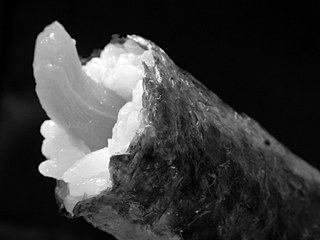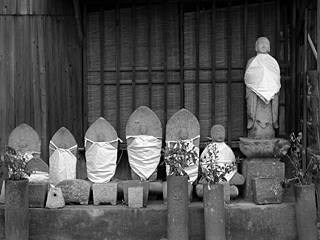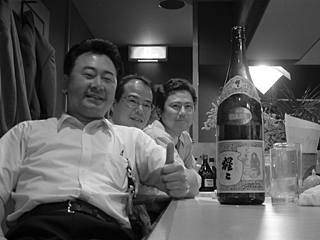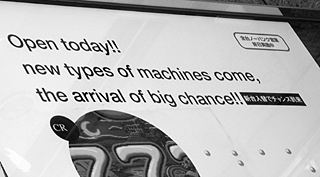
- 21 May 2002
- No. 6,070 (cartoon)
- Whales increase; fishes decrease.
People are in trouble!
Sashimi?! What you say!


- 22 May 2002
- Sushi Alive!
- I’m looking at a wiggling piece of flesh(?) emerging from my sushi.
This just can’t be right.


- 23 May 2002
- I Don’t Understand the Buddhas
- I spotted a row of stone Buddhas—at least I think they were Buddhas—in a residential neighborhood. I felt like I’d stumbled on a petrified family of two adults and six infants. Each of the representations was wearing a cloth that looked like a bib. Four of the infants were covered in yellow cloth, one was covered in a pink cloth on top of a yellow cloth, and the sixth small Buddha has the same two cloths in the reverse order. The largest Buddha also wore a yellow cloth covering a pink cloth, and the other large Buddha wore only a pink cloth.
I heard a disco/pop version of the fourth movement of Beethoven’s Ninth Symphony blaring from a smoky pachinko parlor.
I saw a television advertisement for the Happiness and Dream Club in which a lithe, young woman kicked and wrestled with a computer-generated foe. She beat on the English word “cancer” until she’d changed it to “answer.” The hotel television provided a brief good-bye message when I turned it off.
Be careful with fire.
Good night.
I passed a very petite woman wearing a t-shirt with the English word “miniature” spelled across her chest in a large, sans-serif font. (Gill Sans, Ultra Bold?) (I wonder if Japanese fonts also come with and without serifs?)
I have almost no idea what I’m seeing. Japan becomes more and more distant the longer I’m here.


- 24 May 2002
- Drinking with Yoshio
- I came across a lovely sight tonight when Parmesan and I were walking down an Osaka alley. (I use the nickname “Parmesan” because “Palmer-san” is too difficult to pronounce.)
I saw an attractive woman holding a huge piece of broiled fish in her chopsticks; she was offering it to a big, beautiful, Maine coon cat. (I know “big, beautiful, Maine coon cat” is repetitiously redundant, but I just had to say it. Had to.) I have no idea why a Maine coon cat came to Japan. Probably for all the tasty fish.
The woman invited us inside. It turns out that she was the proprietor of a tiny restaurant that also served drinks. (Or, it may have been a bar that served food; what do I know?)
What a treat! It was the first real—no gaijin except us—Japanese establishment that I’d visited. I knew we were in the right place when the proprietor pulled out a magnum of sake and handed it to the ruddy salaryman sitting beside me. The bottle had a caricature of him drawn on the side; it was his bottle of sake.
This is how it works in Japanese bars: you don’t buy a drink of whisky or sake, you buy a whole bottle. The bartender stores it for you when you leave and returns it when you come back. I think it’s a great system; it simplifies accounting, eliminates evil portion control, and makes it easy for a customer to offer a guest a drink.
I’m delighted to report that Yoshio, the owner of the large bottle, generously offered me a drink. He was so eager to pour that he spilled a bit. It tasted great, not like the swill the Japanese export to lesser nations. (Note to self: find out why sake is served cold in Japan and hot elsewhere.)
I had a pleasant conversation with Yoshio and his mates. Although I speak/spoke not a word of Japanese and neither Yoshio nor any of his mates spoke English as a native language, we conversed in the universal language of drunks. “Beautiful ... thank you very much ... lovely ... excellent ... you’re welcome ... perfect ... hai!”
One of Yoshio’s pals poured me another glass of sake; he too spilled some while pouring. I guess spilling is a Japanese thing, something like the Western practice of offering libations to absent friends.
Hai!
You can learn a lot about other people’s cultures by drinking with them.
Beautiful. Lovely. Excellent. Perfect.
Hai!


- 25 May 2002
- The Arrival of Big Chance
- I took my last photograph in Japan near the Osaka airport. The image shows an ad—in English—promoting the most recent Japanese electronic gizmos.
Open today!!
new types of machines come,
the arrival of big chance!!
What a perfect poem, a brilliant description of the contemporary Japanese spirit in only a dozen words!
Until mañana, sayonara Japan.

- 26 May 2002
- Cowardice is Forever
- I had an amazing conversation yesterday with the man who sat beside me on the long flight from Osaka to San Francisco. He told me about his experience in the war, graphic stories about horrific cruelty and barbarism. The old soldier saved the worst story for last. Or, he may have waited until he was leglessly drunk enough to admit what he did.
After four days in the jungle—and ambushes that killed seventeen of his fellow soldiers—his patrol chased a sniper into a small village, then lost him. When none of the terrified locals would reveal where the sniper was, the soldiers opened fire on the civilians. They eventually killed everyone in the village, every child and every adult. Thirty-one dead, no witnesses.
The massacre was just one of many atrocities in the war, and the slaughter was never reported or investigated.
“I never shot a single civilian, never,” said the soldier.
“I suppose that doesn’t make it any easier,” I replied.
“You’re damn right,” he replied shaking his head. “I think about it every hour of every day. I was telling the truth when I said I never hurt anyone in that village. By the same token, I never did anything to stop it either.”
I took another drink and didn’t say anything.
“Later, they gave me a medal for bravery, but it doesn’t mean anything now, not to me, not to nobody. Heroism is fleeting; cowardice is forever.”
The old veteran soon fell asleep, or perhaps he just passed out from all the gin he drank. He didn’t wake up until just before the plane landed in San Francisco. After that, he ignored me.
I told the soldier’s tale to Reggie this afternoon.
“Let me guess,” said Reggie, “he’s either an American from the Vietnam war or a really old Japanese guy talking about World War II.”
“It doesn’t really matter,” I concluded. “People and wars are all the same.”

- 27 May 2002
- The Joke’s on Me
- I like misleading jokes, like the one that begins, “What do you call four Mexicans walking into quicksand?”
Ideally, I like to ask that question in a room full of progressive, sensitive people. Most of them twitch nervously, and glance at each other anxiously wondering whether I’m going to make a racist joke.
After just the right pause, I announce the punch line: “Quatro cinco!”
In a similar vein, I like to pose a riddle to my fellow feminists. A father and his son have a horrible accident; the father is killed and the gravely-wounded son is taken to the hospital. The surgeon takes one look at the boy, then announces, “I cannot operate on my own son.”
Who’s the surgeon?
I’ve heard incredibly convoluted answers: the father came back to life, the father was a priest and not the biological father, the son died and the conversation took place in the afterlife, and so on.
Answer: the surgeon was the boy’s mother. Although I’ve found many ways to anger women in my life, this joke exposing innate sexist prejudices seems to be one of the best.
Today, I read about an artist named Zeek Sheck. Sheck works in a variety of outfits and disguises; the review I spotted talked about an informational presentation on how to commit suicide using gas.
I thought Sheck was doing work worth plagiarizing, so I kept reading to find more of his ideas worth stealing. And then I noticed that Zeek Sheck is a woman.
Oops!
The joke is on me.
As usual.


